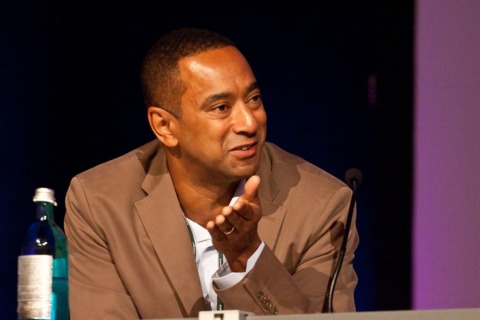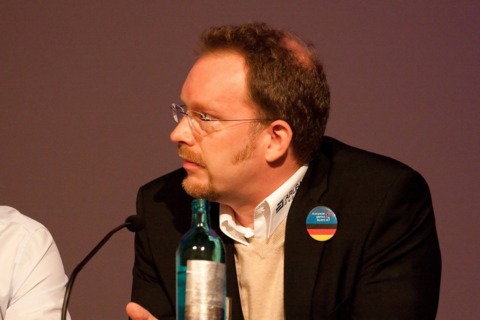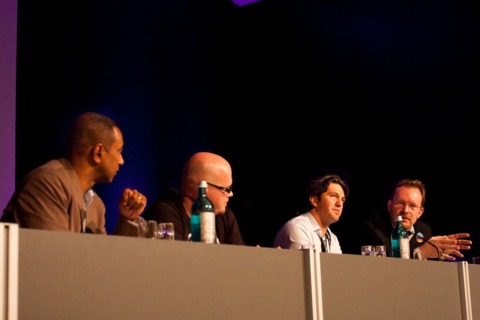Overcoming hurdles of video game political activism
GDC Europe 2010: Members of industry trade groups join developers to discuss challenges of garnering support against anti-game legislation.
Who was there: The discussion was moderated by the Entertainment Software Association's Richard Taylor. Joining him were Stephan Reichart from the German Game Developers Association, Matias Myllyrinne of Remedy (Alan Wake), and Avni Yerli of Crytek (Crysis 2).

What they talked about: The panel was titled "Building Grassroots Video Game Activist Networks" and dealt with the game's industry's response to the threat of stifling legislation. The conversation alternated between road blocks that grassroots organizations face in dealing with politicians on such issues and the experiences of game developers trying to create games in this political environment.
Taylor began with a discussion of the current climate of violent game laws in Europe, bringing up recent legislation in Germany and Switzerland, while also suggesting that the Dutch Ministry of Justice is currently looking into banning violent imagery in media with a particular focus on games. Taylor used these examples as a launching point to ask the panelists a series of questions about how such legislation will affect the industry.
The first question was a general inquiry into how these laws might adversely affect games as a whole. Myllyrinne responded with a few interesting anecdotes about how violent game laws affect the development process. For example, it's hard for a developer in Europe to pitch a game featuring four-fingered cartoon characters because of the connection some might draw to violent political regimes cutting off parts of people's hands.
Reichart suggested that the current discussion in Germany has shifted more toward games as a potential source of addiction rather than a violent influence. He said that it's hard for older politicians to understand how people consume games because of a generational gap. Even though Reichart mentioned that many of Germany's younger politicians are in fact gamers, the older and more influential ones continue to lack knowledge of games and thus new issues, such as addiction, will just replace the old ones.

Yerli agreed that this generational gap is one of the biggest threats to the games industry today, as the older generations lack the media competency to understand how games and online cultures function. To help combat this, Yerli said that his studio has developed a proactive strategy of inviting politicians into the Crytek offices to show these lawmakers the breadth of work that makes up a modern game and that the final product is such a larger package than the bloody screenshots you see online. Taylor then fired a shot at anti-games legislators relying on such a quick snapshot of a game, saying "The screenshot is a cheap way to mobilize an attack on our industry."
When the conversation turned toward the role of grassroots activists in Europe, Reichart had some interesting things to say about how German politicians respond to an organized public. He brought up a recent online petition that a number of German gamers signed in protest of a violent video game law. When the petition was brought to the attention of the politicians, it was roundly dismissed on account of it being an online petition and not a collection of signatures on a real pad of paper. This led to a feeling of defeat from those involved in the petition. Reichart used this example to reinforce his earlier argument of a generational gap being a key hurdle for gamers to overcome. In an environment where politicians struggle to understand modern forms of communication, Reichart said, it's critical to educate them on modern technology they otherwise won't understand.
Another issue discussed by the panel was how lawmakers approach the distinction between games and other forms of media. The general consensus among the panel was that games deserve to be judged in the same way as books, movies, and music. Reichart brought up the double standard that games face from governments in how the issue of violence is judged. He used another example from Germany's recent past. The German government helped to fund the production of Quentin Tarantino's violent World War II movie Inglorious Basterds and praised the film when it went on to win multiple awards. But the same legislators, according to Reichart, are the ones who refused to let Dragon Age: Origins win a national video game award due to the game's heavy use of blood. His suggestion was that grassroots organizations need to continue to compare games and movies so that lawmakers understand the parallels between the two forms of media.

Quote: "Time is on our side," said Myllyrinne. "I'm going to call it the 'Ozzie Osbourne Factor.'" This was in reference to his opinion that parents and lawmakers will eventually come to realize, just as they did with heavy metal of the '70s and '80s, that games won't turn kids into violent maniacs. Or to quote Myllyrinne once more, children won't suddenly become "bat-eating sons of Satan."
Takeaway: It's a difficult political environment that game developers and industry association members find themselves in, but they're confident that with enough education and dialogue they can convince lawmakers that games deserve the same treatment as other forms of media.
Got a news tip or want to contact us directly? Email news@gamespot.com
Join the conversation